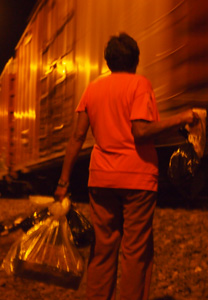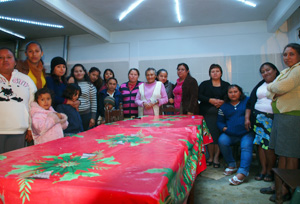
Carmen gives out food bags. Credits: Worms/Caritas
It is 7:30pm, in Amatlan, in the province of Cordoba Veracruz. The train whistle blows in the distance. In Norma Romero Vazquez’ kitchen, headquarters of the “Patronas “, women bustle about.. Carmen, 90, the oldest of the women in the family, takes a crate filled with bags of food.
Along with her daughters and granddaughters, Carmen goes to the railway that passes about ten meters away from her house. Over a distance of a kilometer, the fifteen women share the crates out between themselves. When the light of the train appears, they get as close as possible to the tracks and stretch out their arms laden with food bags. “God bless you”, cry the migrants aboard the goods train. In a few minutes, the train has gone. Back to Norma’s kitchen.
For over 15 years, Carmen, Norma and the others have been handing out food, clothing and medicines to the migrants on board the trains. Every day, every time a train passes their community, they are there, arms outstretched, laden with what charity enables them to give.
“Thank goodness God is with us and the food multiplies”, says Rosa, one of Norma’s sisters. She recalls how it all started.
“One Sunday, one of my sisters and I went to buy milk and bread. As we were coming home, we were called by people on a train that was passing our house. “Food, give us something to eat”, they cried.Seeing their distress, we gave them what we had bought. When we got home, we were worried about our mother’s reaction. But she simply said we would need to find more food to hand out the next day. Since then, we haven’t stopped.”
Today, over 200 bags of food are ready to be handed out each day. All the women in the family are involved in preparing and handing out food to the migrants. The youngest help in the kitchen before they are big enough to get close to the train and take part in the distributions.
“The emotion of giving food to migrants perched on the trains is indescribable, says one of Carmen’s granddaughters. And when I see my mother and my grandmother with their arms full of crates, I just have to help them.”
In the summer, it is not uncommon to see up to 200 migrants aboard one train. This evening, there were only about twenty. “It’s because of the harsh winter nights, explains Norma. The men and women who get across at this time of year have to fight the cold as well as tiredness, hunger, and the criminals threatening them.”
The Patronas know full well what the migrants who want to go to the United States have to endure. They all have a brother, a husband or a son who left the community to seek work in the neighbouring country.

All the women in the family are involved in preparing and handing out food to the migrants. The youngest help in the kitchen before they are big enough to get close to the train and take part in the distributions.
Credit: Worms/Caritas
Here, Central American migrants are considered like members of the family. In the 15 years that the Patronas have served them, they have had to adapt to their changing needs and face all sorts of situations. Handing out food is no longer enough. They also need clothes, medication, and the women need to be ready to defend those who are under threat.
“Last month, a young man fell from the train, and his legs were cut off, says Bernarda, another of Norma’s sisters. The migrants on the train shouted out what had happened, and we managed to find the young man and take him to hospital. Today, his life is no longer in danger.”
Another time, the Patronas stood in the way of the police forces that came to arrest the migrants who had climbed onto the train. “We told them that if they wanted to take them, they had to take us all. We haven’t had any problems with the migration services since, says Norma.”
The parish Caritas supports the group of Patronas by giving them charity vouchers. This enables them 4 times a week to receive bread donations from a wholesaler in the region. Father Julian, Caritas leader in the community, never wastes an opportunity to praise the work of these remarkable women and to incite the rest of the population to support their action.
“As long as God gives me the strength, says Carmen, as long as men and women will have to climb on board these trains to survive, I will continue to go towards them.”
